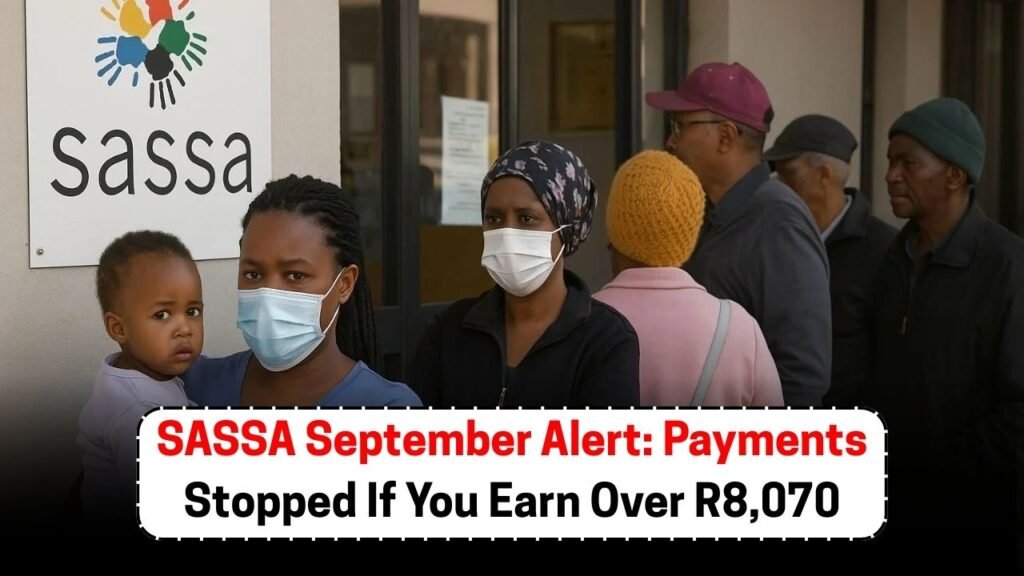High-Earner Warning – The South African Social Security Agency (SASSA) has issued an important update regarding its grant distribution for September. According to the new regulation, individuals with a monthly income exceeding R8,070 may no longer be eligible to receive certain social grants. This threshold is designed to ensure that financial aid is directed toward those who are most in need, particularly vulnerable groups such as pensioners, unemployed citizens, and low-income households. With rising living costs and economic pressures, many South Africans depend heavily on SASSA payments for survival. However, the agency emphasizes that grants are strictly meant as a safety net for people without sufficient income, and higher earners should not rely on state support. This move has sparked discussions around fairness and the sustainability of the social security system. For millions of South Africans, staying updated on these eligibility requirements is crucial to avoid payment interruptions or unexpected suspensions.
Why the Income Cap Matters for SASSA Beneficiaries
The R8,070 income cap acts as a filter to identify those who truly need government assistance. SASSA grants, including the Older Persons Grant, Disability Grant, and Social Relief of Distress (SRD), are meant to reduce poverty and provide relief for households that struggle to meet basic needs. When higher earners also claim grants, it strains the budget allocated for welfare programs and reduces funds available for deserving recipients. By enforcing this income threshold, SASSA ensures better targeting of resources and prevents misuse of taxpayer money. Critics argue that the cap may be too strict for families with high expenses, while supporters say it strengthens fairness in the system. Beneficiaries must carefully monitor their declared incomes, as exceeding the limit—even temporarily—could result in delayed or cancelled payments. Awareness of this rule is essential for ensuring uninterrupted support and planning household budgets accordingly.
Impact on Grant Recipients and South Africa’s Welfare System
The decision to stop payments for high earners highlights the challenges of balancing social assistance with economic realities. South Africa has one of the most extensive welfare programs on the continent, supporting over 18 million citizens. However, funding these programs requires careful allocation, especially as the government deals with inflation, unemployment, and budget constraints. For recipients, the cap means stricter eligibility checks and more accountability when reporting financial information. Some may feel pressured if they experience sudden income increases that push them above the R8,070 threshold. For others, this change reinforces the idea that SASSA grants are meant for those without alternative income streams. On a broader scale, the move could strengthen the sustainability of the welfare system by reducing unnecessary payouts, thereby allowing more funds to reach the most vulnerable members of society.
How to Check Eligibility and Avoid Grant Suspension
Beneficiaries worried about their eligibility should regularly update their personal and income details on the SASSA system. Those receiving additional earnings from part-time jobs, pensions, or other sources must disclose this information to avoid penalties. SASSA conducts routine means tests, and any inconsistencies in income reporting can trigger suspension of payments. To confirm eligibility, applicants can visit official platforms such as the SASSA website or check their status through online grant portals. In addition, contacting local SASSA offices can provide clarity on individual cases. Financial planning also plays a role—if income exceeds the R8,070 cap, individuals should prepare alternative sources of support rather than relying on grants. Staying proactive ensures that households remain secure even if payments are interrupted, and it prevents sudden shocks when compliance issues arise.
Preparing for the Future: What Beneficiaries Should Do Next
For South Africans close to the R8,070 monthly threshold, it is important to prepare for possible changes in their grant status. This includes exploring other support options, such as community-based programs, non-governmental initiatives, or additional employment opportunities. Families dependent on grants should also budget carefully, ensuring that essentials like food, transport, and school fees are prioritized. While the income cap may feel restrictive, it reflects a long-term effort to stabilize the welfare system and ensure that grants continue reaching those who rely on them the most. Beneficiaries can stay informed through credible news sources like News24 and financial guidance platforms that explain government policy updates. By adapting early and staying informed, South Africans can better navigate the changing landscape of social support, ensuring that they remain financially secure even when grant regulations shift.





